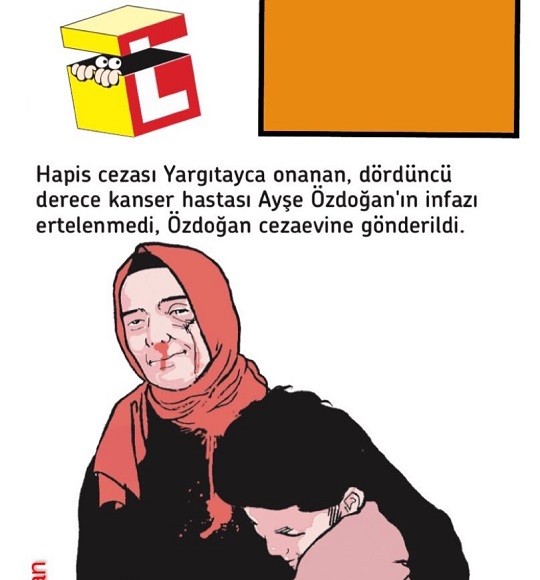Turkish authorities last week arrested critically ill Ayşe Özdoğan, who suffers from a rare form of cancer, and sent her to prison on a terrorism conviction, refusing to postpone the execution of her prison sentence, in a move that has drawn criticism from human rights activists, doctors, opposition politicians, journalists and social media users among others.
On April 8, 2019 Özdoğan, 34, a former teacher, and her husband were detained for alleged links to the Gülen movement, but she was released due to her son’s heart condition. Her husband was sent to prison in southern Antalya province.
She developed cancer seven months later and underwent an operation on November 12, 2019. She was arrested shortly thereafter, convicted on terrorism charges and handed down a nine year, four month prison sentence. An appeals court on June 11 upheld her sentence despite severe health problems and a hospital report saying she was not fit to stay in prison.
Meral Danış Beştaş, parliamentary group deputy chair of the pro-Kurdish Peoples’ Democratic Party (HDP), on Wednesday called on Turkish authorities during a speech in parliament to release Özdoğan and all other critically ill prisoners so as to protect their right to life.
“It’s torture and [serves as] a death warrant to arrest a patient with stage 4 cancer and transport her [from prison] to a hospital every day,” Beştaş said.
“First and foremost, we must defend the most fundamental right, the right to life, and justice for all. Ayşe Özdoğan, a patient with stage 4 cancer who was arrested after her request for a postponement of her sentence, which is a legal right, was denied, should be released for the continuation of her treatment,” Dr. Sare Davutoğlu, wife of former Prime Minister Ahmet Davutoğlu, the current leader of the opposition Future Party (GP), said in a tweet.
“[Disabled] 4th stage cancer patient Ayşe Özdoğan has been arrested. It’s said that Özdoğan, who was sent back to the hospital soon after her arrival in prison, was in bad shape and that she couldn’t meet her most basic needs, such as using the bathroom,” the Turkish weekly satirical magazine Leman also tweeted on Thursday.
The magazine also posted an illustration showing Özdoğan with blood on her face due to scars caused by the surgeries she underwent, holding her son, who has a heart condition.
Özdoğan’s teeth, palate, zygomatic bone and lymph nodes were removed in an emergency operation, after which she lost her ability to see and hear due to the trauma her facial bones suffered. She previously tweeted she could no longer eat solid foods and suffered from a chronic infection in her sinuses, where a tumor was removed. She added that she could not chew or swallow because of the cancer.
Nihal Bengisu Karaca, a columnist with the pro-government Habertürk news website, on Wednesday said Özdoğan’s request to postpone the execution of her sentence wasn’t “a privilege,” but “a right, and even a duty for officials.”
She cited Article 16 of Law No. 5275 on the Execution of Penalties and Security Measures, which stipulates that the prison sentence must be postponed if its execution presents a danger to the life of the convict.
Posting a video of Özdoğan in a tweet, Karaca added, referring to critically ill inmates in Turkey, “Ayşe Özdoğan is now the symbol of the cruelty towards these poor people. Shame on those who watch this misery and sleep soundly at night.”
Turkish President Recep Tayyip Erdoğan has been targeting followers of the Gülen movement, a faith-based group that focuses on science education, volunteerism, community involvement, social work and interfaith and intercultural dialogue that is inspired by the teachings of Muslim preacher Fethullah Gülen, since the corruption investigations of December 17-25, 2013, which implicated then-prime minister Erdoğan, his family members and his inner circle.
Dismissing the investigations as a Gülenist coup and conspiracy against his government, Erdoğan designated the movement as a terrorist organization and began to target its members. Erdoğan intensified the crackdown on the movement following a coup attempt on July 15, 2016, that he accused Gülen of masterminding. Gülen and the movement strongly deny involvement in the abortive putsch or any terrorist activity.
Critics have slammed Turkish authorities for refusing to release critically ill prisoners. Ömer Faruk Gergerlioğlu, a deputy from the HDP, previously said critically ill political prisoners were not released from prison “until it reaches the point of no return.” He depicted the deaths of seriously ill prisoners in Turkey who are not released in time to receive proper medical treatment as acts of “murder” committed by the state.

